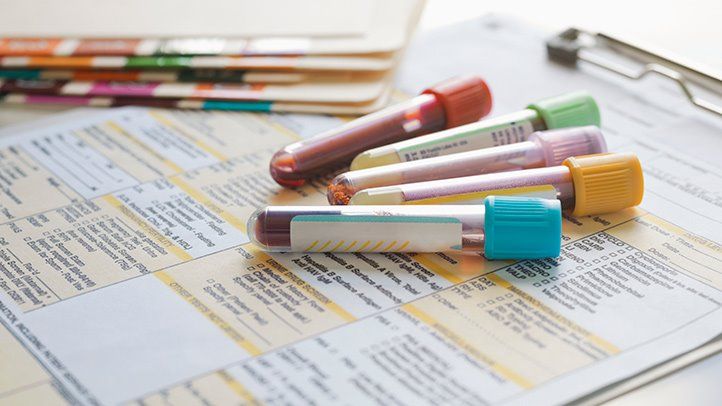While your body goes through hormonal changes every day (hello, mood swings!), big dips like those that occur during hypothyroidism can signal danger, as a lack of thyroid hormone production causes the body’s functions to slow down.
Signs and Symptoms of Hypothyroidism
Hypothyroidism Symptoms in Adults
Look out for these potential symptoms of hypothyroidism:
- Weight gain
- Fatigue
- Sensitivity to cold temperatures
- Depression
- Dry skin
- Thinning hair
- Heavy menstrual periods (in women)
- Trouble sleeping
- Difficulty concentrating
- Pain or swelling of the joints
- Constipation
- High cholesterol levels
- Muscle weakness
Hypothyroidism Symptoms in Infants
Hypothyroidism in infants may include these symptoms:
- Jaundice (yellowing of the skin and whites of the eyes)
- Frequent choking
- Puffy face
- Constipation
Hypothyroidism Symptoms in Children and Teens
- Poor growth or short stature
- Delayed puberty
- Slow reaction time
- Weight gain
- Coarse, dry hair or skin
- Muscle cramps
- Delayed mental development
- Increased menstrual flow (in girls)
Learn More About the Signs and Symptoms of Hypothyroidism
How Is Hypothyroidism Diagnosed?
- A physical exam
- A blood test
- An imaging scan
If these tests show an elevated thyroid-stimulating hormone (TSH) and low levels of thyroid hormones — like free T4, total T3, or free T3 — it may be an indication that you have hypothyroidism, says Mayumi Endo, MD, an endocrinologist in Seattle.


10 Things That May Affect Your Thyroid Test Results
How to Prepare for an Upcoming Doctor’s Appointment for Hypothyroidism
Keep a journal that details your symptoms and their severity. Bring your notes to your appointment to share with your doctor. This can help the doctor detect patterns in your hypothyroid symptoms and get a better idea which screenings you may need for a proper diagnosis.
Bring a list of the vitamins, herbal supplements, and prescription or over-the-counter medications you currently take. These items may interact with your treatment regimen, so your doctor should know about them.
Make a list that details your personal health history, including major surgeries. Include family members and relatives who have had thyroid or autoimmune diseases.
Ask the office ahead of time if you need to fast for your blood work. This means that you can’t eat or drink after midnight the day of your appointment, with the exception of water.
Make a list of questions you want to ask your doctor. That way, you won’t forget anything during your appointment.
What to Expect Before and After Your Appointment
Prognosis of Hypothyroidism
Treatment and Medication Options for Hypothyroidism
There are a number of treatments for hypothyroidism, usually involving medication. Some people also use alternative medicines to help them manage their disease, too.
Common Medication for Hypothyroidism Treatment
“Studies after studies show levothyroxine is the best treatment of choice,” Dr. Endo explains. She notes that some people are allergic to the generic form of levothyroxine, mostly due to the color dye. In that case, you can use either the levothyroxine 50 microgram pills (these don’t have dye in them) or the brand Tirosint, although this is more expensive.
Treatment with levothyroxine is usually continued for the rest of your life, but your doctor may adjust your dose over time.
Why Figuring Out the Right Dosage of TSH May Take Some Time
Factors That Can Affect the Proper Absorption of Levothyroxine
The absorption of levothyroxine, the most common prescription used to treat hypothyroidism, can be influenced by many foods and medications. It’s important to take levothyroxine in the morning with water, at least 30 minutes before eating.
- Multivitamins
- Calcium and iron supplements
- Antacids
- Walnuts
A Quick Warning About Subclinical Hypothyroidism and Ineffective Treatment
Alternative and Complementary Therapies


7 Real-Life Tips to Relieve Hypothyroidism Symptoms
Hypothyroidism Treatments That Don’t Work
One treatment that medical doctors do not recommend? Natural dessicated thyroid products (either porcine or bovine products). The most common is the pig thyroid extract called Armour. Because the components of the pig’s thyroid hormone are very different from those of a human being, medical professionals recommend against using this agent, Endo says. These are most often prescribed by naturopathic doctors.
Learn More About Treatment for Hypothyroidism: Medication, Alternative and Complementary Therapies, and More
Hypothyroidism Diet
If you're taking thyroid hormone replacement for hypothyroidism, you may want to avoid consuming certain foods within a few hours of taking your thyroid medication. Some foods, like calcium, iron, and multivitamins, may block absorption of the thyroid hormone so should be taken four hours apart from levothyroxine, Endo says.
- Soybean flour and cottonseed meal
- Iron and calcium supplements
- Antacids containing aluminum or magnesium
- Some ulcer or cholesterol-lowering drugs
- Walnuts
Overall, it is most important for people with hypothyroidism to eat a well-balanced diet, rather than consuming any particular food group, Endo says.
Learn More About What to Eat and Avoid if You Have Hypothyroidism
Prevention of Hypothyroidism
Research and Statistics: How Many People Have Hypothyroidism?
Resources We Love
Favorite Orgs for Essential Thyroid Disease Info
American Thyroid Association
Founded nearly a century ago, the American Thyroid Association is one of the most trusted and well-known thyroid organizations; it provides the latest information on diseases that affect the thyroid gland. On its website, you will find a variety of thyroid-related brochures, updated treatment guidelines, and more. If you’re looking for the latest information on hypothyroidism research and treatment, be sure to sign up for the Friends of the ATA newsletter, which is delivered via email.
Hormone Health Network
This is another one of our favorite patient-centered websites for hypothyroidism, thanks to its vast library of in-depth information pertaining to the causes and symptoms of this condition. Because hypothyroidism is a hormone-related condition, you can also learn more about other aspects of endocrinology that could affect your thyroid. Be sure to check out the pages on pregnancy, goiter, stress, and more.
National Institute of Diabetes and Digestive and Kidney Diseases (NIDDK)
A branch of the National Institutes of Health, the NIDDK is a leader in research pertaining to all kinds of endocrine diseases, including hypothyroidism. Be sure to review and bookmark the NIDDK’s webpage on hypothyroidism as you prepare for your first appointment with your endocrinologist. Check out the list of risk factors and causes to have on hand as you discuss diagnosis and treatment options with your doctor.
American Association of Clinical Endocrinologists
This website isn’t for doctors only. Enter the Public Community Portal’s thyroid page for professional knowledge related to hypothyroidism treatment guidelines and other related conditions, such as thyroid nodules, to better prepare yourself for your appointment with an endocrinologist. While you’re there, you can also learn how to check your own thyroid gland in this step-by-step guide.
Favorite Alternative Medicine Resource
National Center for Complementary and Integrative Health (NCCIH)
Depression, stress, and fatigue are some of the many symptoms you might experience with hypothyroidism. Alongside any medical treatment, you may be tempted to research yoga and other complementary practices for support. Before you do, talk to your doctor and come armed with information from this resource. We like the NCCIH because it provides straightforward and up-to-date research on alternative medicine.
Favorite Online Support Network
Thyroid Federation International
Looking for a local or online support group? We like Thyroid Federation International because of its ability to help patients connect with one another across global borders. Wherever you’re located, finding a support group near you is simple via this list of member organizations.
Favorite Resources for Diet Advice
Thyroid Dietitian
While no specific diet can cure hypothyroidism, eating well can help you feel your best. Still, it can be difficult knowing which foods to eat and avoid, as well as how to cook thyroid-healthy meals. If you need help getting started, check out some of the resources offered by registered dietitian Nicole Morgan, including her YouTube channel featuring free cooking and exercise tips, as well as recommendations for thyroid diet books, grocery shopping must-haves, and beauty products. Be sure to discuss these diet and exercise tips with your doctor before getting started.
Favorite App
BOOST Thyroid
If you want an easier way to track your symptoms and lab results, look no further than the BOOST Thyroid app for Apple devices. It helps you track more than 20 symptoms each day to help you discover patterns you can discuss with your endocrinologist. We also like how the app lets you look at your blood work and past treatments for a better understanding of your thyroid hormone changes.
The BOOST Thyroid app is free to download on Apple products, but you will need a membership to access all of the benefits. In the Apple store, you can try out a monthly membership for $3.49 or an annual membership for $14.99. Currently, BOOST Thyroid is under production for Android devices, and you can sign up here to make sure you receive the latest updates.
Additional reporting by Stephanie Bucklin and Lynn Marks.
Editorial Sources and Fact-Checking
- Hypothyroidism (Underactive Thyroid): Symptoms and Causes. Mayo Clinic. November 19, 2020.
- Thyroid Disease. Office on Women’s Health. April 1, 2019.
- Thyroid and Weight. American Thyroid Association. 2019.
- Hypothyroidism (Underactive Thyroid): Symptoms and Causes. Mayo Clinic. January 7, 2020.
- Rastogi MV, LaFranchi SH. Congenital Hypothyroidism. Orphanet Journal of Rare Diseases. June 2010.
- Hypothyroidism. Children’s Hospital of Philadelphia.
- Thyroid Hormone Treatment in Children and Adolescents. American Thyroid Association. 2019.
- Hashimoto’s Disease: Symptoms and Causes. Mayo Clinic. February 11, 2020.
- Hashimoto’s Disease. National Institute of Diabetes and Digestive and Kidney Diseases. September 2017.
- Thyroperoxidase Antibodies, Serum. Mayo Clinic Laboratories.
- Total Thyroidectomy Complication Rates and Costs Are Lower if Surgeon Performs 25 or More Cases Yearly. American College of Surgeons. October 7, 2015.
- Thyroid Tests. National Institute of Diabetes and Digestive and Kidney Diseases. May 2017.
- Preparing for Your Upcoming Appointment With an Endocrinologist. Thyroid Patient Advocacy.
- Levothyroxine. GoodRx.
- Q&A: TSH (Thyroid Stimulating Hormone). American Thyroid Association.
- Hypothyroidism Diet: Can Certain Foods Increase Thyroid Function? Mayo Clinic. September 4, 2019.
- Complementary and Alternative Medicine in Thyroid Disease (CAM). American Thyroid Association.
- Singh P, Singh B, Dave R, Udainiya R. The Impact of Yoga Upon Female Patients Suffering From Hypothyroidism. Complementary Therapies in Clinical Practice. August 2011.
- Hypothyroidism: Should I Take Iodine Supplements? Mayo Clinic. August 28, 2020.
- Hypothyroidism: Self-Care. Michigan Medicine. July 28, 2019.
- Hypothyroidism Secondary. UCLA Health.
- Wiersinga WM. Myxedema and Coma (Severe Hypothyroidism). Endotext. April 25, 2018.
- Mathew V, Misgar RA, Ghosh S, et al. Myxedema Coma: A New Look Into an Old Crisis. Journal of Thyroid Research. September 2011.
- Hypothyroidism. (Underactive Thyroid). National Institute of Diabetes and Digestive and Kidney Diseases. August 2016.
- Sahay RK, Nagesh VS. Hypothyroidism in Pregnancy. Indian Journal of Endocrinology and Metabolism. May–June 2012.
- Key Statistics About Pituitary Tumors? American Cancer Society. November 2, 2017.
- Older Patients and Thyroid Disease. American Thyroid Association. 2020.
- Gesing A. The Thyroid Gland and the Process of Aging. Thyroid Research. 2015.
- Bensenor IM, Olmos RD, Lotufo PA. Hypothyroidism in the Elderly: Diagnosis and Management. Clinical Interventions in Aging. 2012.



































